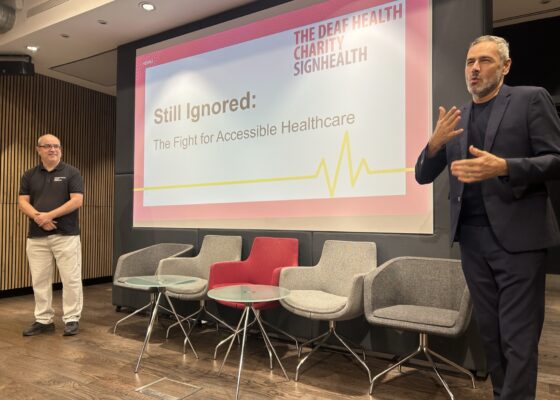
Service Training and consultancy from SignHealth
Make your service more accessible for deaf people with one of our workshops or bespoke support packages.

Mental health services for deaf people are underfunded and often lack comprehensive pathways and specialist provisions. The absence of dedicated services and trained specialists means that deaf people face significant barriers in accessing appropriate mental health care. The Shaping the Future of deaf mental health report highlights these barriers and demonstrates the urgent need for increased investment to ensure that mental health support is accessible and effective for deaf people of all ages.
Involving deaf people in the design and delivery of healthcare services ensures these services meet their needs. By incorporating the insights and experiences of deaf people, healthcare providers can develop a deeper understanding of the unique challenges faced by this community. This collaborative approach leads to the creation of healthcare services fit for purpose, improving access and outcomes for deaf patients. The NHS England Rapid Review of British Sign Language Interpreting Services includes 17 recommendations for Integrated Care Boards (ICBs) to follow, offering guidance on effectively engaging with the deaf community and ensuring their needs are met.
Deaf people frequently encounter significant barriers in accessing healthcare, resulting in inequitable treatment. Our latest report Still Ignored: The fight for accessible healthcare reveals that many deaf people struggle to make appointments, often arrive at appointments without the necessary support, and face difficulties in making a complaint. These obstacles highlight the need for systemic changes to ensure that healthcare services are fully accessible to deaf people, providing them with the same quality of care available to the hearing population. When referring to “equity” we recognise that each person has different circumstances and that the exact resources and opportunities needed to reach an equal outcome should be allocated.
Fantastic to have our Children and Young People’s Team involved in the making of these videos because we want to see these changes in place for the deaf community today and for generations to come.
Use our template letter for deaf, deafblind and hard of hearing people to tell NHS health services about your communication needs ahead of appointments to improve your access to health care and information. Find out more about campaign Still Sick Of It.

We believe that there needs to be a greater level of investment in deaf mental health services for all ages: children, young people and adults. This should include services provided via BSL in community environments such as schools and therapy centres as well as online.
July 2023
Co-produced report with recommendations about what needs to happen for there to be true equality in deaf mental health support.
May 2017
A guide by the Joint Commissioning Panel
for Mental Health with evidence-based guidelines about mental health services for deaf people.
2007
Find more research in the UK’s first dedicated deaf mental health library.
Deaf victims and survivors of domestic abuse have specific needs that need to be considered – especially the need to have provision in BSL. We are incredibly proud of the services we offer in this space. In the future, more domestic abuse services should be inclusive of deaf people; police and health professionals should have greater awareness of the deaf community and there should be better data on violence against women and girls from the deaf community.
May 2025
SignHealth submission to identify gaps in services and provisions.
August 2021
Written evidence submitted by SignHealth (VAW0042).
March 2023
Research supported by SignHealth, Manchester Deaf Centre and Pankhurst Trust.
April 2020
Written Evidence Submitted by SignHealth (MRS0215) to the Women and Equalities Committee.
November 2021
Home Affairs Select Committee: Inquiry into Violence Against Women and Girls.
It is vital to ensure fair access to health services for all deaf people. Whether it be GP surgeries, dentists, specialists or hospitals, it is crucial that deaf people are able to access treatment and support in ways that suit their needs. This includes the use of BSL, interpretation, captions and accessible written information.
May 2025
“The real power of this study lies in the stories people shared,” said lead author Dr Bhavisha Parmar.
July 2021
Prepared by the NECS Senior Consultancy Team.
April 2025
Research by RNID and SignHealth reveals serious and widespread healthcare failings affecting over 7 million people.
August 2020
SignHealth conducted a survey asking deaf people about the impacts of the pandemic on mental health, healthcare and information accessibility.
February 2022
Urgent priorities for change, informed by patients’ lived experience and NHS professionals.
August 2016
The standard is a legal obligation that ensures the accessibility of health information and support.
The report Sick Of It is SignHealth’s ground-breaking research uncovering the health disparities deaf people face in the UK. Published in 2014, the report has influenced policy and changed practices in the NHS to improve communication and reduce barriers.
The READY Study is an ongoing study conducted by the Universities of Manchester and Edinburgh into the quality of life and challenges facing young deaf people in the UK.

Sick Of It is SignHealth’s ground-breaking report uncovering the health disparity deaf people face in the UK. Published in 2014, the report has influenced policy and changed practices in the NHS to improve communication and reduce barriers.
Report: Sick Of It
Make your service more accessible for deaf people with one of our workshops or bespoke support packages.

Campaign resources to support health services with improving access to healthcare for deaf people.

Since 2016, the Standard has aimed to improved communication and access in the NHS and adult social care services.

Find a registered interpreter in your area.